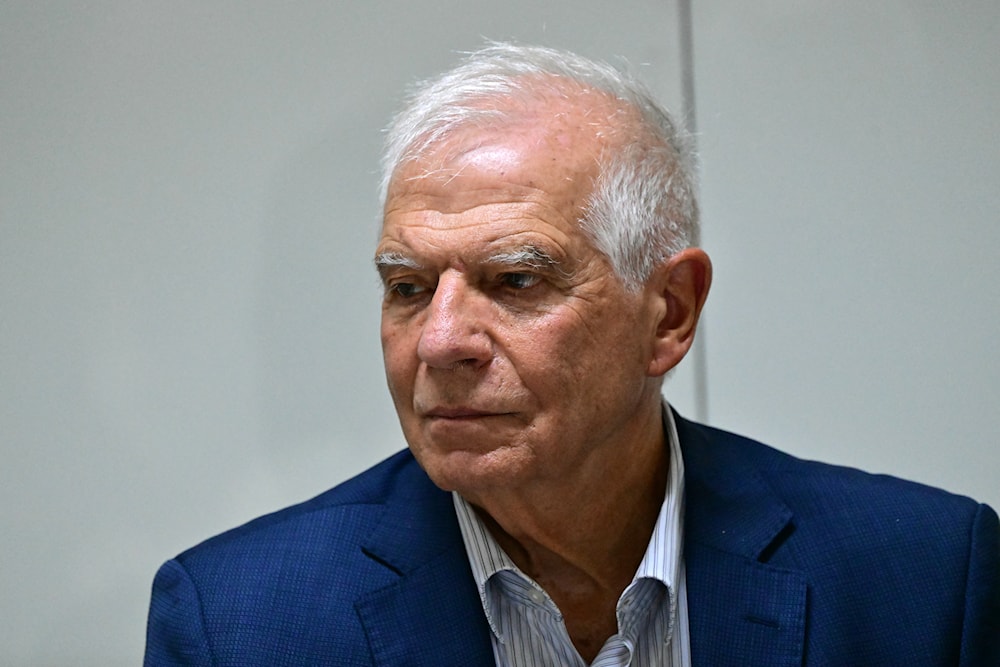EU's Borrell condemns pager attacks on Lebanon that risk escalation
The European Union's foreign policy chief says the electronic attacks that targeted Lebanon led to "heavy, indiscriminate collateral damages among civilians."
-

High Representative of the European Union for Foreign Affairs and Security Policy Josep Borrell speaks during a press conference in Dubai on September 17, 2024. (AFP)
The European Union's foreign policy chief, Josep Borrell, condemned on Wednesday the recent explosion of pager communication devices and walkie-talkies used by Hezbollah, which the Lebanese Resistance group has attributed to "Israel".
Lebanon's Ministry of Health reported that at least 20 people were killed and more than 450 injured in Wednesday's second wave of Israeli electronic attacks.
"Even if the attacks seem to have been targeted, they had heavy, indiscriminate collateral damages among civilians, including children among the victims," Borrell indicated.
"I consider this situation extremely worrying. I can only condemn these attacks that endanger the security and stability of Lebanon, and increase the risk of escalation in the region," he warned.
The top diplomat also emphasized that the "European Union calls on all stakeholders to avert an all-out war, which would have heavy consequences for the entire region and beyond."
Following the first wave of electronic attacks on Tuesday, which killed at least 12 people and injured between 2,750 and 2,800 others, Hezbollah vowed retaliation against "the massacre" that "Israel" committed.
The Israeli terrorist attack on Tuesday left thousands of #Lebanese people wounded and at least 11 martyred as rigged pagers exploded among citizens, even health workers.
— Al Mayadeen English (@MayadeenEnglish) September 18, 2024
The Israeli occupation keeps proving to the world its true nature; a bloodthirsty regime that has plagued… pic.twitter.com/VOC6ppyoiP
Lebanese FM says Hezbollah's response to Israeli attacks 'inevitable'
Lebanese Foreign Minister Abdallah Bou Habib pointed out on Wednesday that a response by Hezbollah to the consecutive Israeli attacks is "inevitable".
In an interview with CNN's Christiane Amanpour, the top diplomat pointed out that "Hezbollah has been dealt a severe blow, and therefore a response is inevitable," adding that after the latest Israeli attacks, the Lebanese government "cannot communicate with Hezbollah now in the same way we did in the past."
Bou Habib cautioned that the deadly explosions could be a warning of a broader war in the West Asia region.
He also highlighted the seriousness of the incident, "because it comes after Israeli threats to expand the focus of the war with Lebanon, which would plunge the region into a larger cycle of violence, and signal a wider war."
"It’s a scary moment and we are afraid [of] coming to war, because we don’t want a war," he stressed.
In a press briefing, White House National Security spokesperson John Kirby claimed that the United States was not involved in the two waves of explosions in Lebanon.
When questioned about the White House's response to Israeli Security Minister Yoav Gallant's comments on "a new era of the war" and the potential for the explosions to trigger further escalation, Kirby stated, "We want to see the war end, and everything we've done from the start has been aimed at preventing escalation."
He added that the US believes "a diplomatic solution is still possible."
Based on Lebanon's request, Algeria called for an emergency session at the United Nations Security Council to examine the latest developments in Lebanon, for which Bou Habib departed Thursday morning for New York to attend.
In a phone call, Algerian Foreign Affairs Minister Ahmed Attaf extended the country's condolences to his Lebanese counterpart, Abdallah Bou Habib, for the victims and martyrs of the Israeli aggression.
Attaf further expressed Algeria's "complete solidarity with Lebanon amid the tragic and difficult circumstances that it is witnessing due to the ongoing and recurrent Israeli violations against its security and stability."
Moreover, Algeria, as a non-permanent member of the UNSC, confirmed that it would continue its efforts and endeavors to defend Lebanon's positions, sovereignty, and interests against the multi-leveled and multi-faceted systematic Israeli escalations.
Read more: 'Israel' clearly intended to target Lebanese civilians: The Guardian

 4 Min Read
4 Min Read









